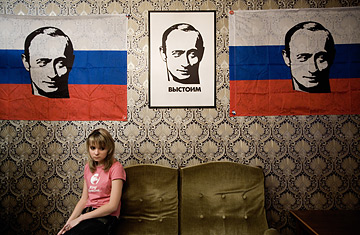
A female member of VV fan club of the Russian president, Vladimir Vladimirovich Putin, sits in a room in Moscow.
(5 of 6)
When Catherine the Great got a copy of Radischev's book, she handwrote angry rebuttals along the margins of each chapter. Among her many quarrels was his account of Novgorod's sacking by Ivan the Terrible. Radischev thought it a crime against humanity; Catherine II saw only a firm ruler consolidating power. When I visited Great Novgorod (its honorific was restored in 1998), I found a city that is still squabbling about its lesson for Russia. Alone among Slavic city-states, it was never conquered by the Mongols — the ancient proverb "Who can stand against the gods and Great Novgorod?" gives a sense of its military power. But it was also a remarkably progressive city, a republic on the Roman model. All its official business was done in a public senate called the vyeche, where the 300 Golden Belts — the city's gentry — would listen to and vote on the complaints of the people. When Ivan the Terrible's grandfather, Ivan the Great, finally conquered the city in 1471 — in a sign of just how important, and dangerous, the freedoms of Novgorod's citizens were — he confiscated the city's charter and took the bell that called the vyeche to session with him back to Moscow. Novgorod was great no more.
Almost 500 years later, Sergey Troianovsky has established a unique profession for himself in Novgorod — as a sort of dissident archaeologist. He leads a volunteer group of activists and academics who try to preserve and promote relics of the vyeche era. He's interested in cultural heritage and also in political pedagogy. To him, there's a clear moral to Novgorod's history. "We are not a political group," he said. "But we want to show people that democracy is not an idea forced on us by the European Union. It's part of our past."
War over Words
Radischev's book was made possible by a slight liberalization that Catherine the Great surely came to regret: allowing private citizens to operate their own printing presses. By publishing his manuscript on the ground floor of his home, he began a war for press freedom that still rages. Today, for example, the Russian government doesn't just have supporters at the national television stations; it owns the stations outright. In a meeting at the Kremlin before I began my trip, Putin's spokesman didn't even try to deny that national news was slanted in the government's favor. But he said the regional media were thriving and independent. Study them, he said, and "you will understand that this is the freest country in the world."
I met journalists throughout my travels and found the Kremlin's assessment disingenuous at best. "In America, you are free to criticize Bush," a television talk-show host told me in his kitchen in Novgorod. "Me too. I am also free to criticize Bush." He laughed. Then, not smiling, he said, "I'm actually scared to be talking to you. TIME magazine is far away. But if I express my opinions, I'll have to face the authorities — not Putin, but someone here on a local or provincial level. I'll lose my job."